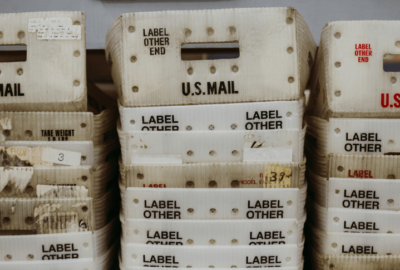A former senior member of the Postal Service’s Board of Governors says interventions by the Trump administration into its operations challenged the agency’s independence and led to his resignation in late April.
David Williams, the board’s former vice president, said Treasury Secretary Steven Mnuchin repeatedly sought to influence USPS labor agreements during his tenure, as well as postage pricing decisions and volume discounts given to some of its largest customers — including Amazon, UPS and FedEx — despite warnings from USPS officials.
“I resigned from the Board of Governors because I was convinced that its independent role had been marginalized and that representations regarding an independent postal service for the nation were no longer truthful. I felt that the public was owed the truth in this matter,” Williams said Thursday in an ad-hoc hearing held by the Congressional Progressive Caucus.
Williams said Mnuchin repeatedly called on postal governors with specific instructions and requests, and expressed displeasure with USPS decisions he disagreed with. Mnuchin led a 2018 White House postal task force and issued recommendations that remain the Trump administration’s foundation for postal reform proposals.
Those requests escalated, however, during negotiations over the terms of a $10 billion loan guaranteed to USPS under the CARES Act. Williams said a draft of the loan’s terms “moved all the important decision-making” from USPS to Treasury, but the provision didn’t make it into the final agreement.
“I’m not sure I’ve run into that before, where one department is trying to run another department. Normally you would reject the effort and report it to Congress,” Williams said.
Members of the House Oversight and Reform Committee wrote a letter to Mnuchin in April expressing concern with the ongoing negotiations, and government operations subcommittee chairman Gerry Connolly (D-Va.) told Federal News Network that Treasury’s had sought greater influence in USPS business decisions.
Williams said the agency’s vetting process for Postmaster General Louis DeJoy had also raised concerns and contributed to his resignation.
He said DeJoy, to his knowledge, was not a candidate selected by Russell Reynolds Associates, the search firm USPS hired to find a new postmaster general. Instead, he said another member of the board helped move DeJoy’s name forward after having lunch together.
The USPS board interviewed more than a dozen candidates, Williams said, but among them, DeJoy initially told the selection committee he wasn’t sure if he wanted the job. According to Williams, Governor John Barger also intervened to help DeJoy complete some of his responses during the interview process.
“He didn’t strike me as a serious candidate. He does have the experience of the logistics support, working with the Postal Service and others. That’s a fairly narrow part, it was essentially moving our empty equipment back to places where it could be filled,” he said.
Reps. Raja Krishnamoorthi (D-Ill.) and Katie Porter (D-Calif), in a letter Thursday, asked Barger whether he discussed DeJoy’s selection with Mnuchin or “any Republican party official.”
“It would have been irregular for a member of the USPS Board of Governors, such as yourself, to recommend Mr. DeJoy without the consultation, research, or support of the contracted hiring firm Russell Reynolds Associates,” the lawmakers wrote.
Williams’ testimony comes a day before DeJoy is slated to testify before the Senate Homeland Security and Governmental Affairs Committee. On Monday, DeJoy will appear before members of the House Oversight and Reform Committee.
Both hearings will focus on operational changes DeJoy has implemented to cut transportation and overtime costs, which have led to delays in mail delivery. The Postal Service recently announced that it would hold off on more sweeping changes – such as cutting post office hours and removing mail-sorting equipment and mailboxes – until after the November election.
Despite congressional concerns, Williams said USPS officials made assurances that “confidence could not be higher” that the agency could handle a higher level of voting by mail given the coronavirus pandemic. The agency had also briefed state and local government officials about vote-by-mail preparations.
If anything, USPS officials told Williams said a sharp drop in marketing mail during the pandemic meant the Postal Service wouldn’t encounter any capacity issues when delivering election mail.
American Postal Workers Union President Mark Dimondstein told lawmakers the union in “confident that the Postal Service is in a position to safely and securely handle election mail this November.”
Copyright
© 2024 Federal News Network. All rights reserved. This website is not intended for users located within the European Economic Area.

